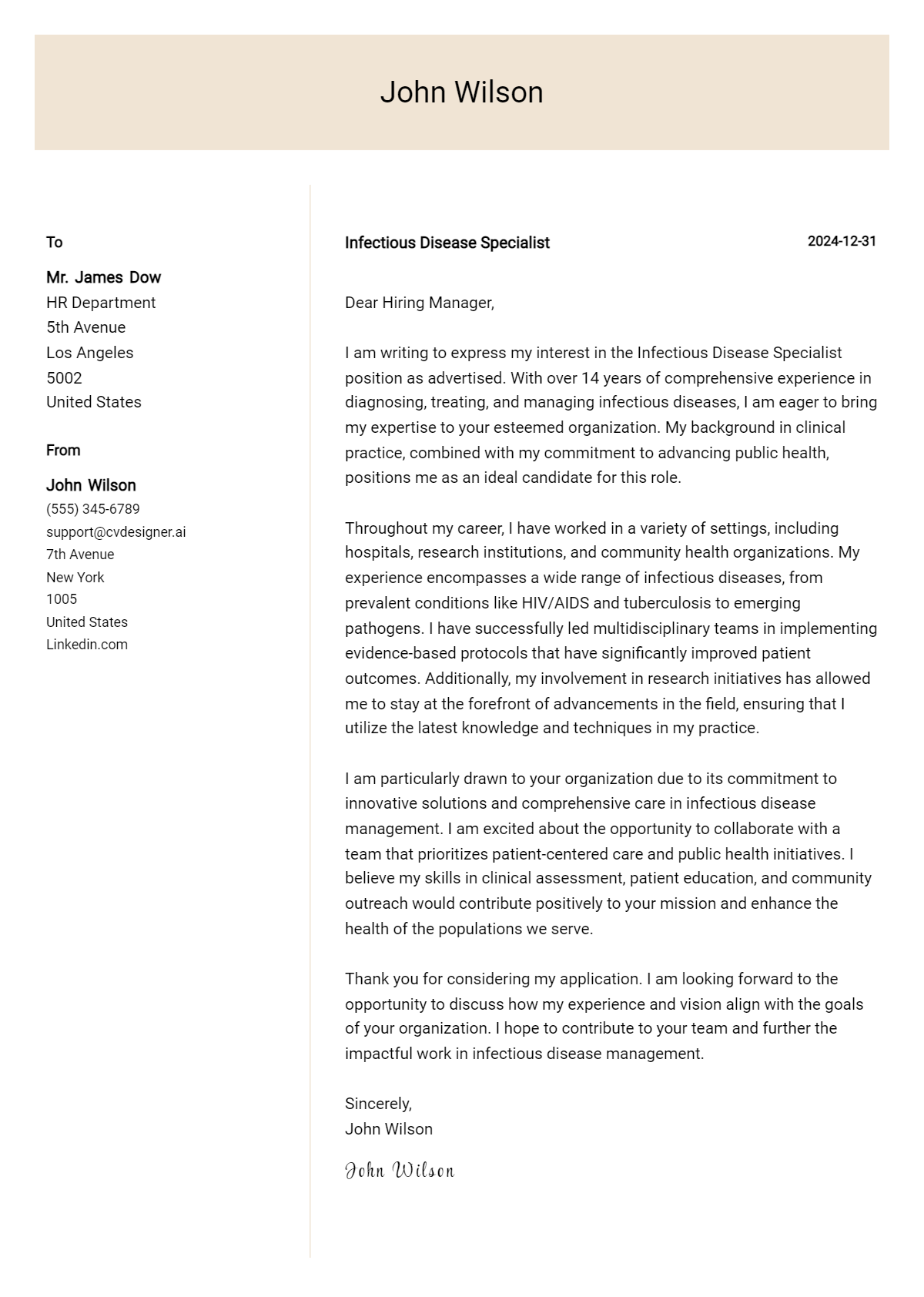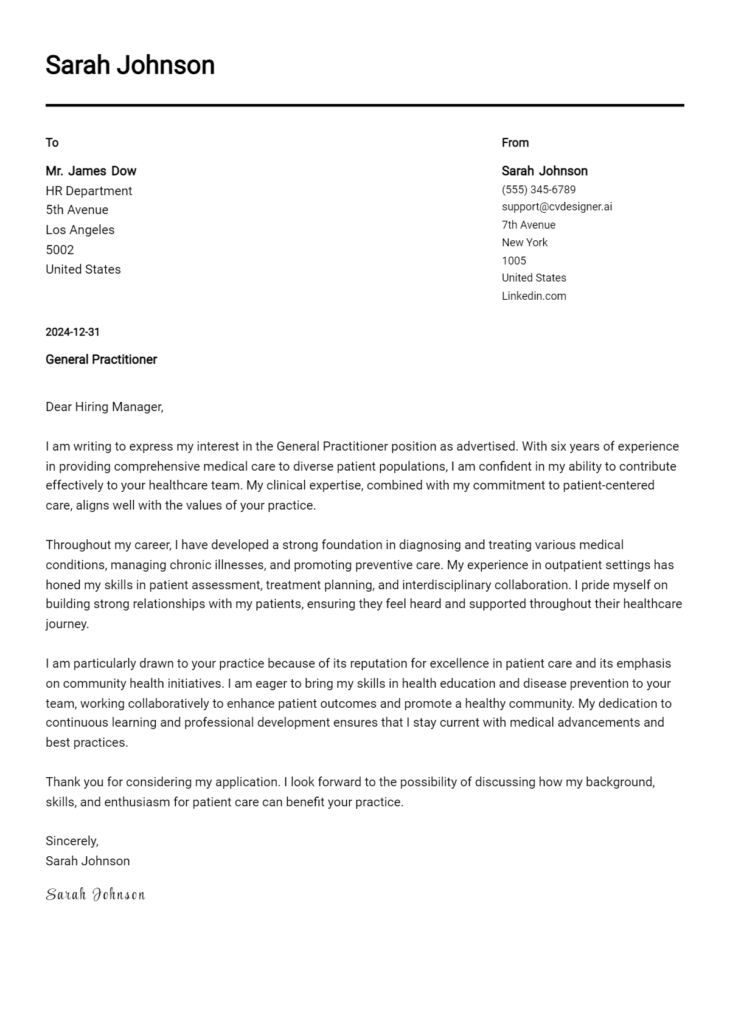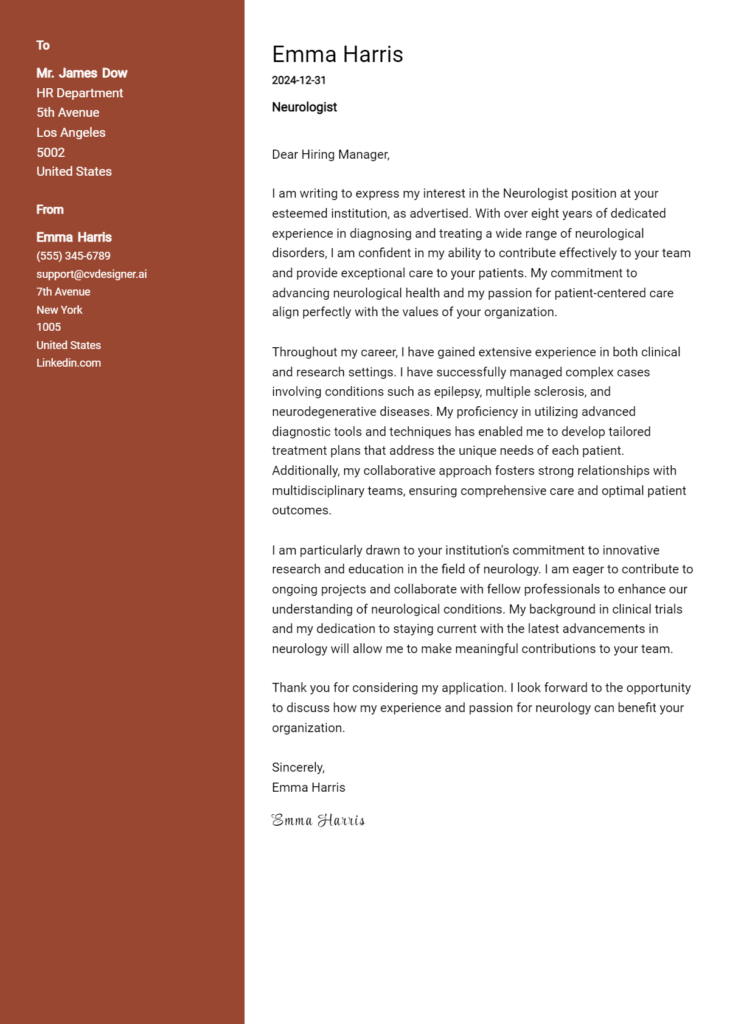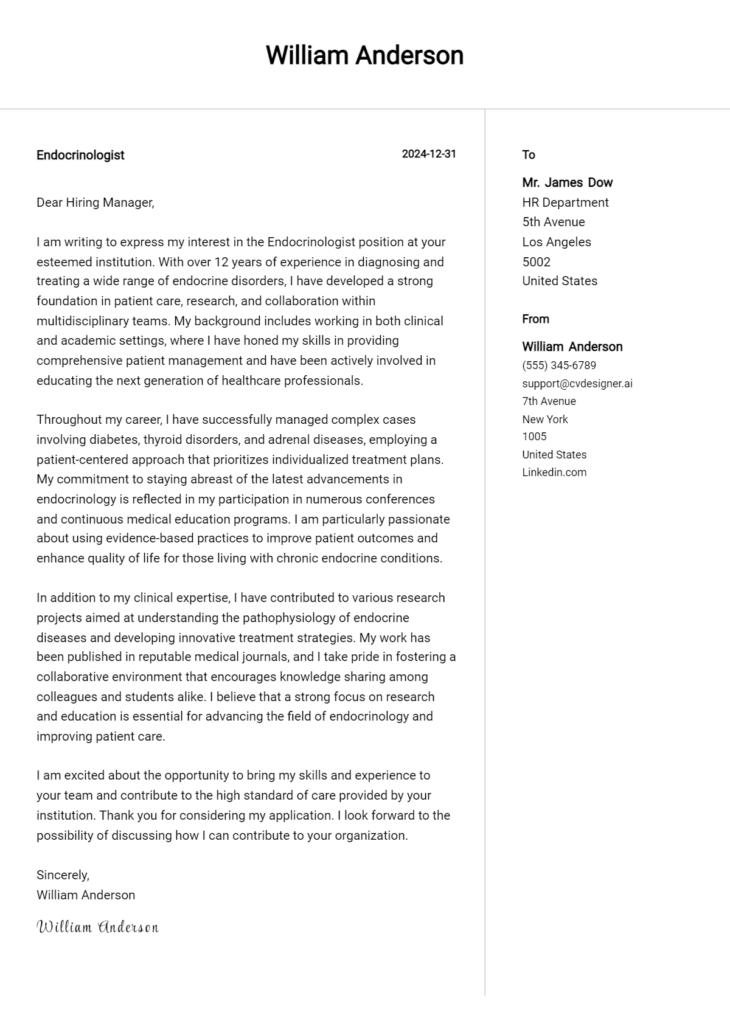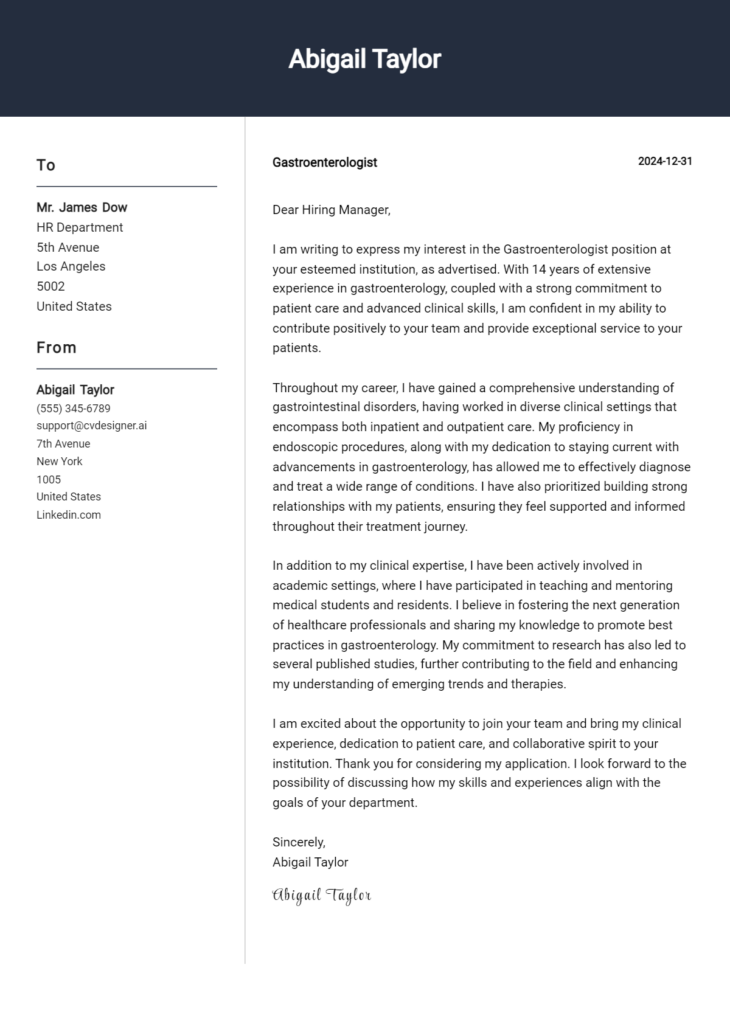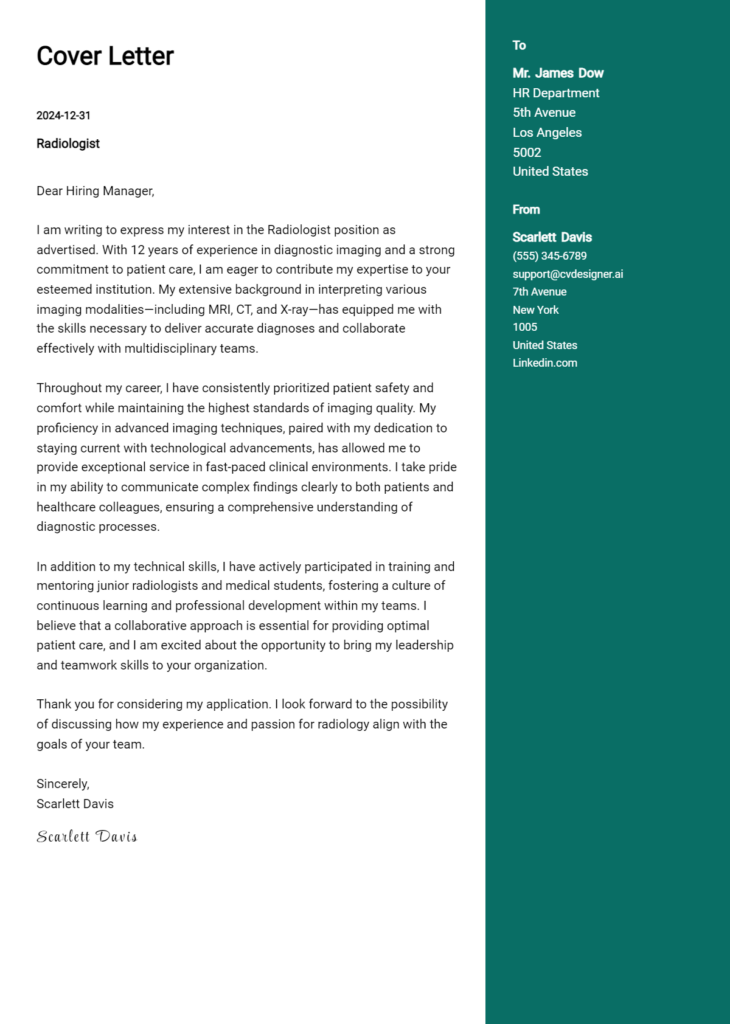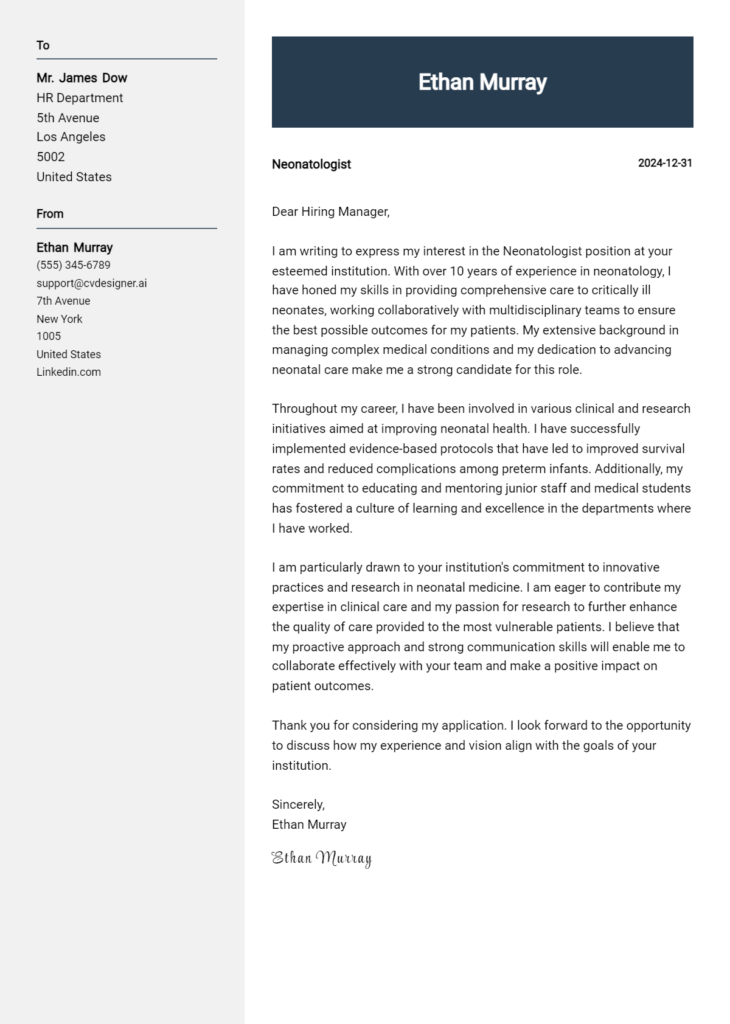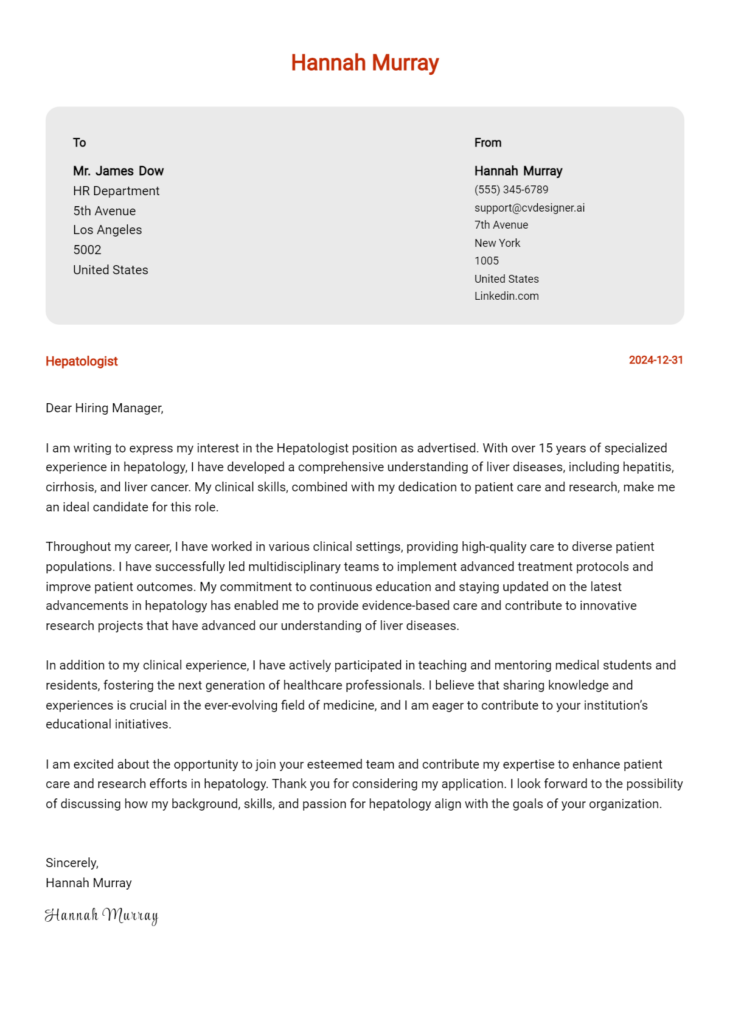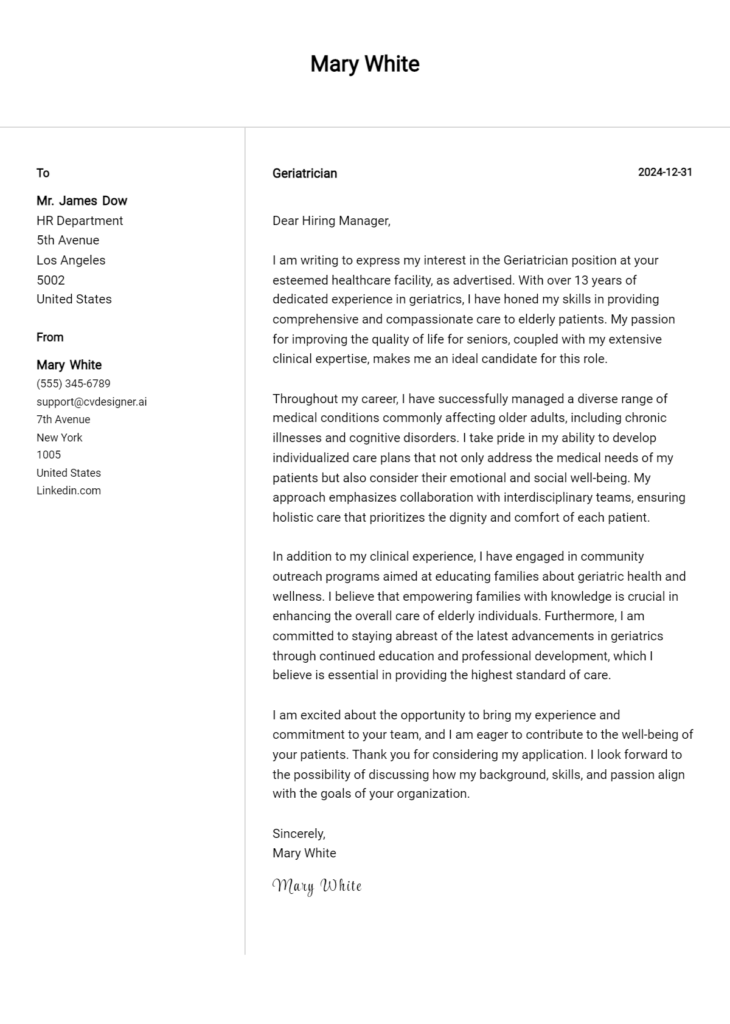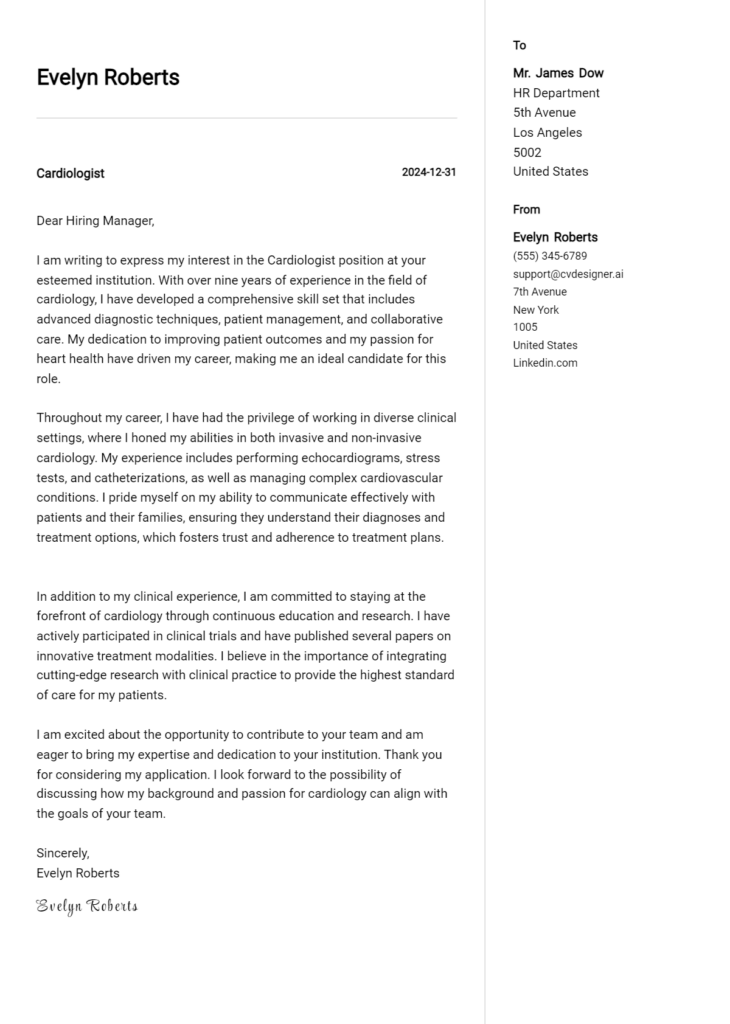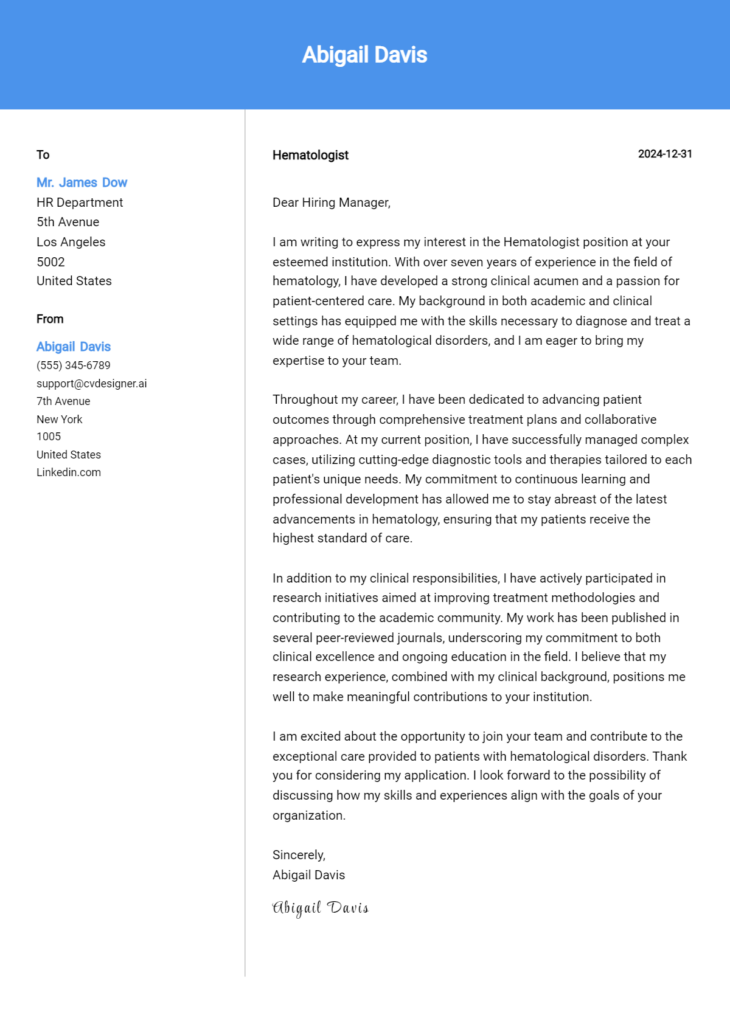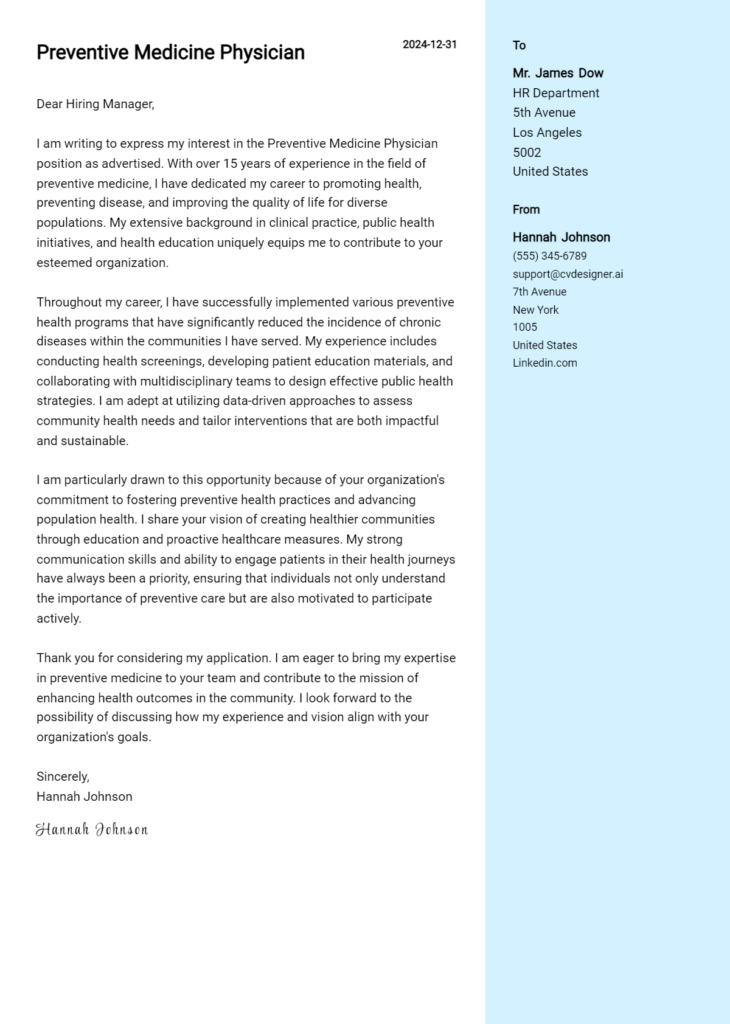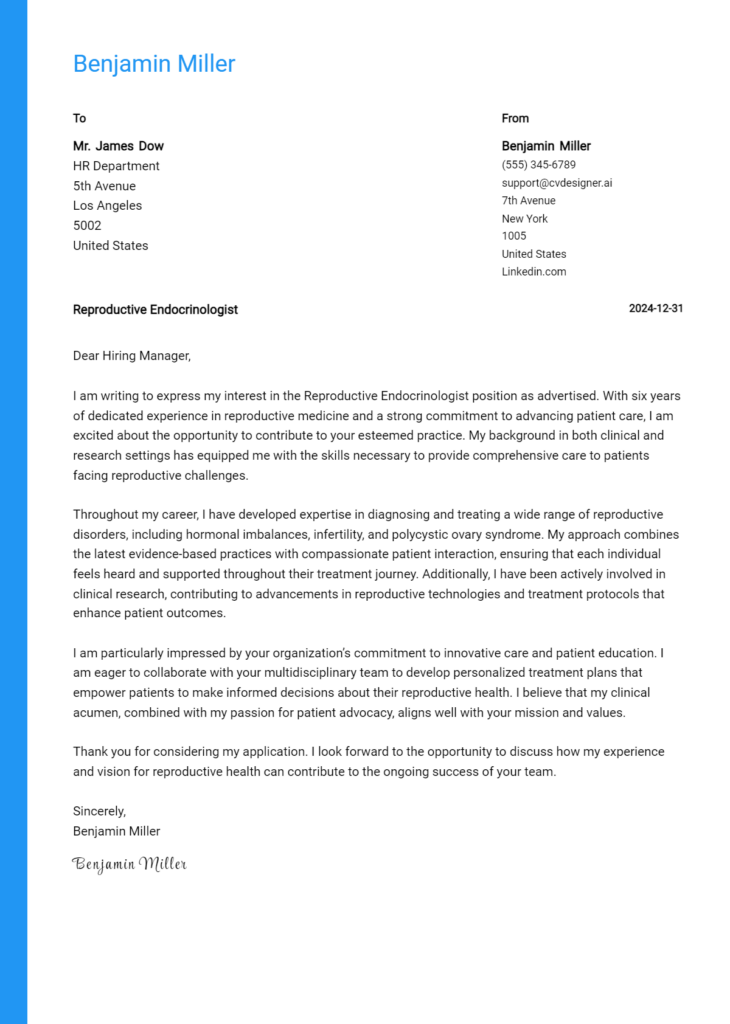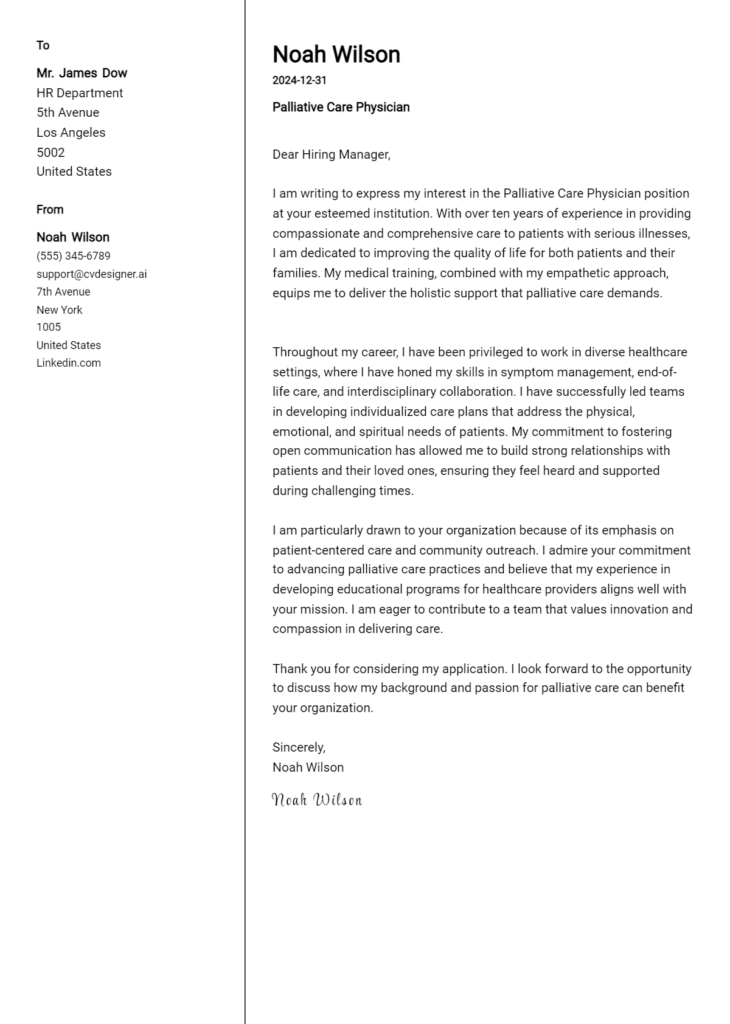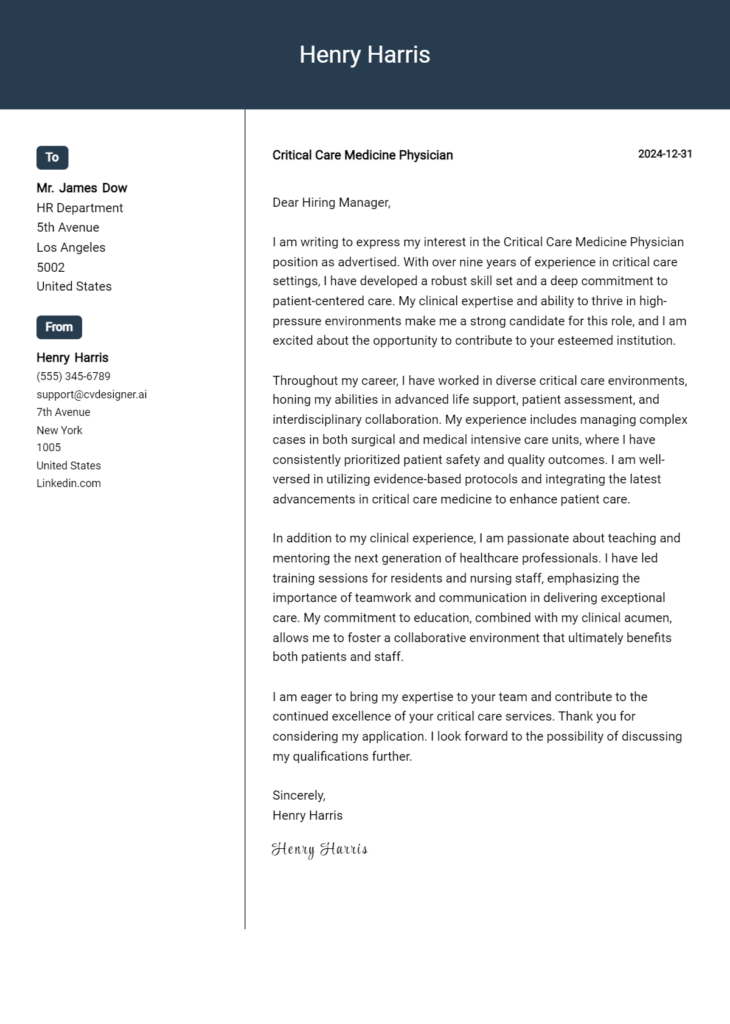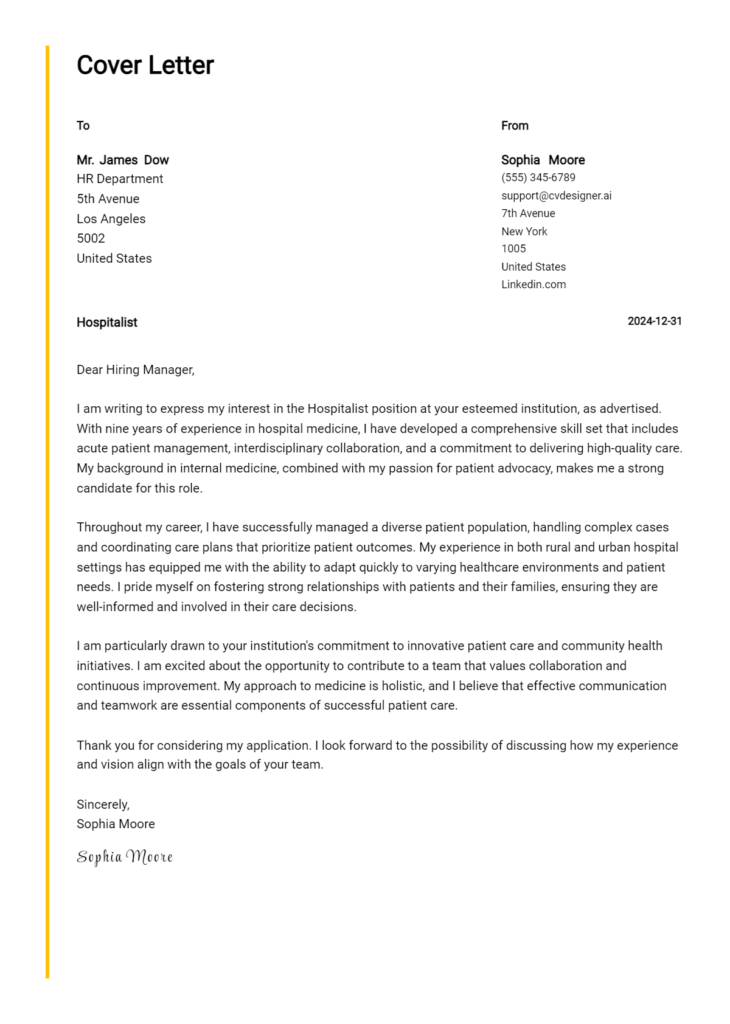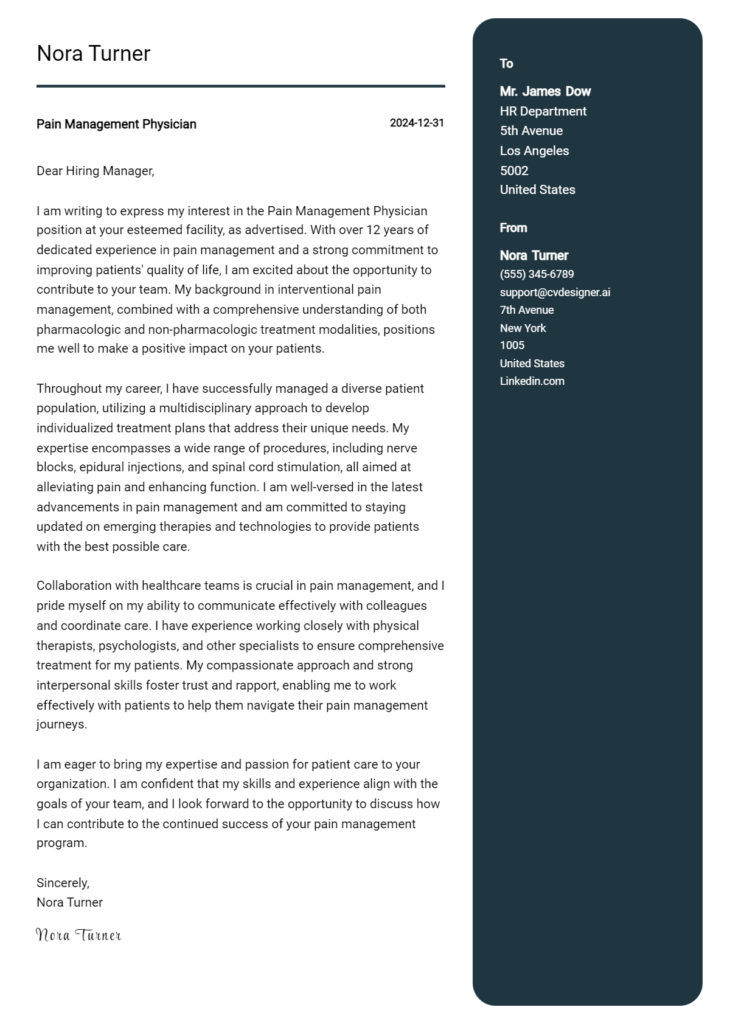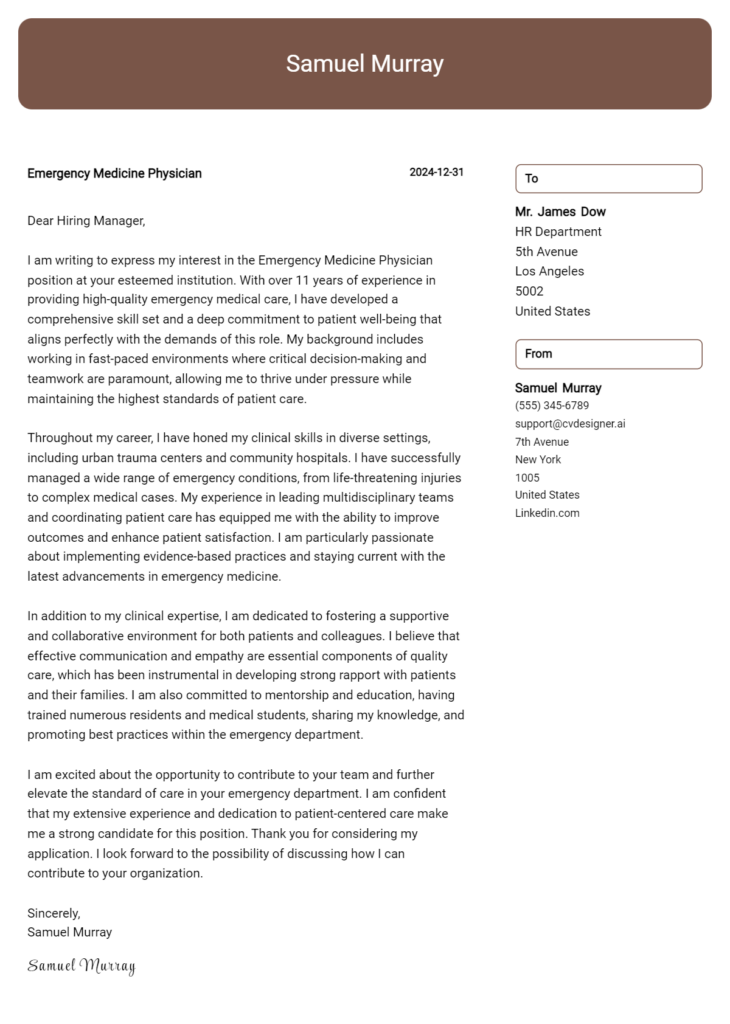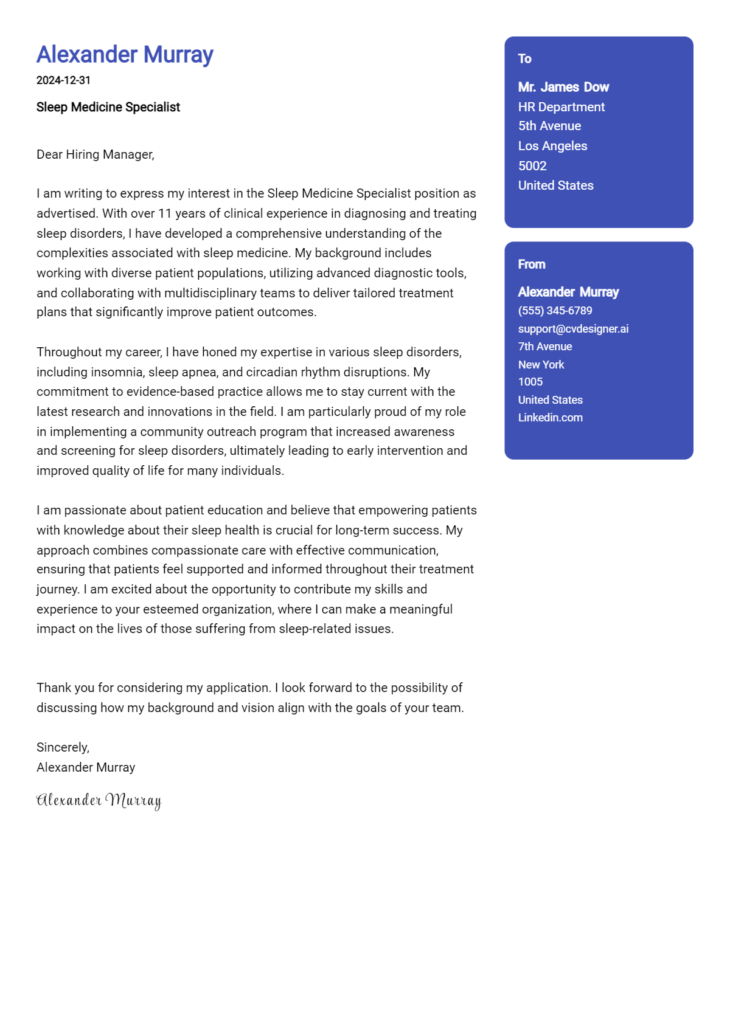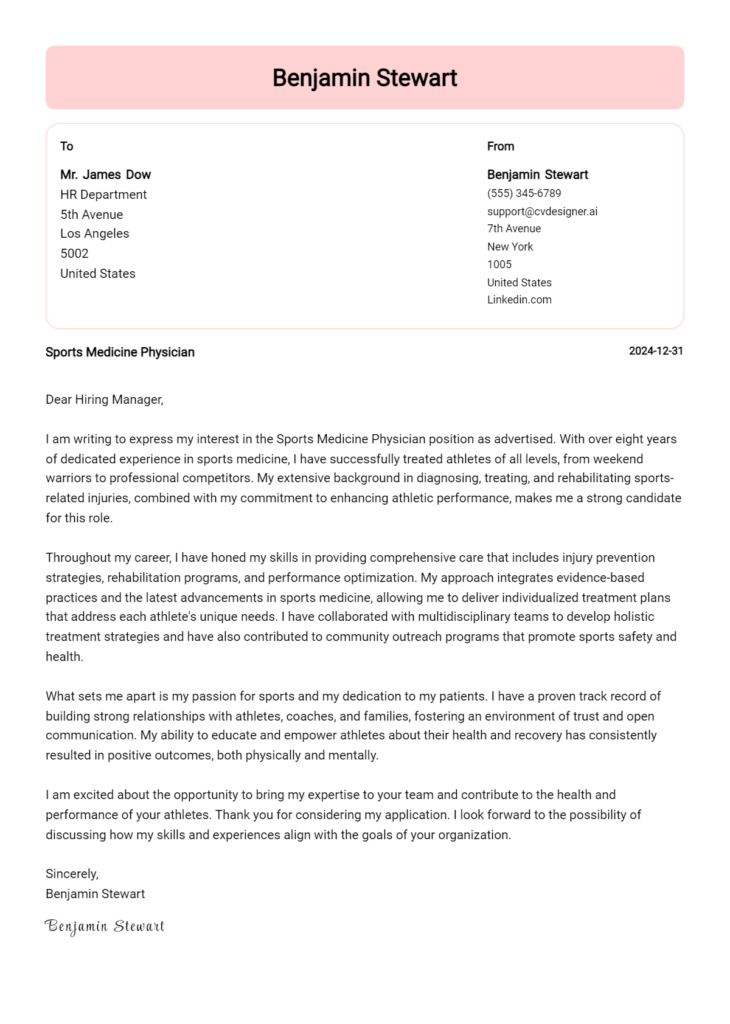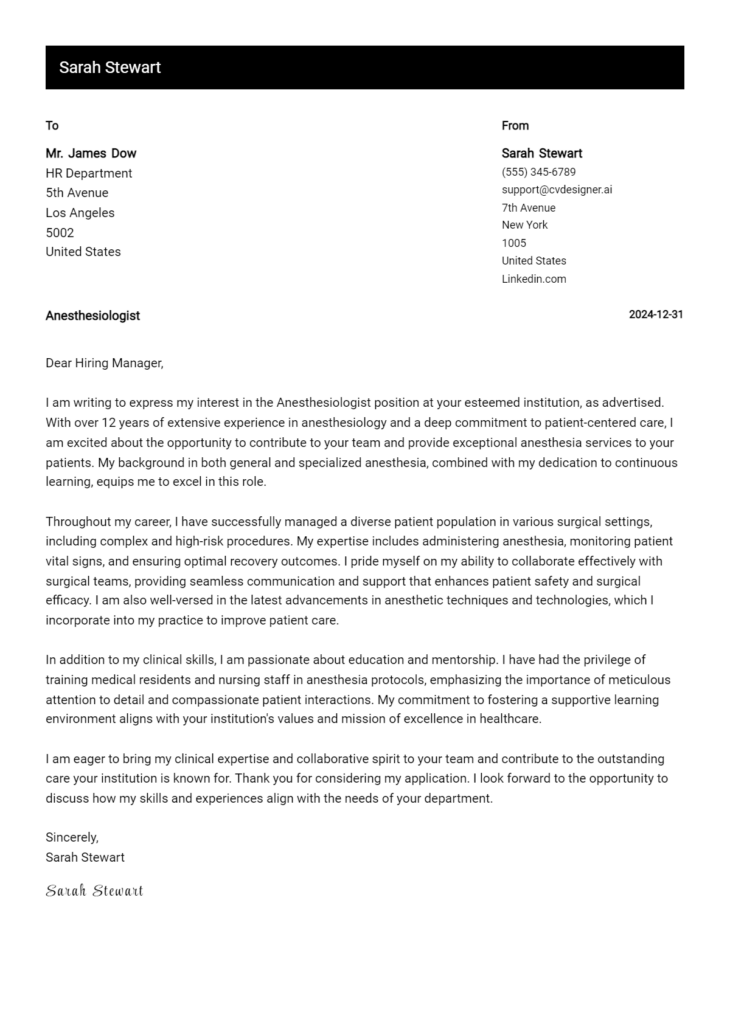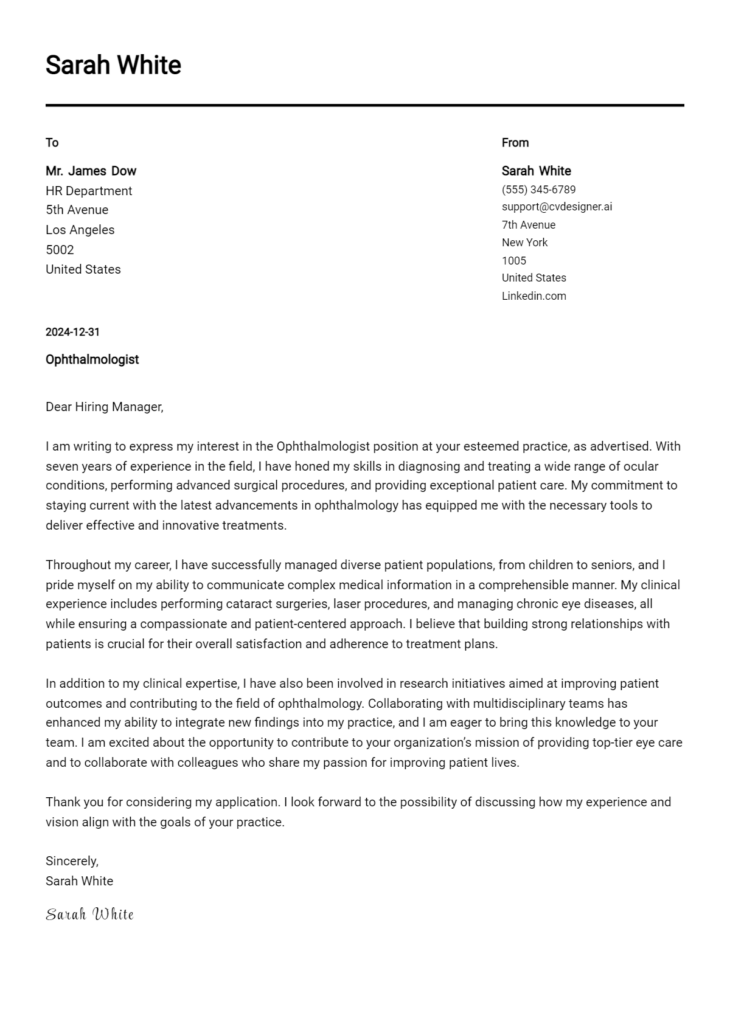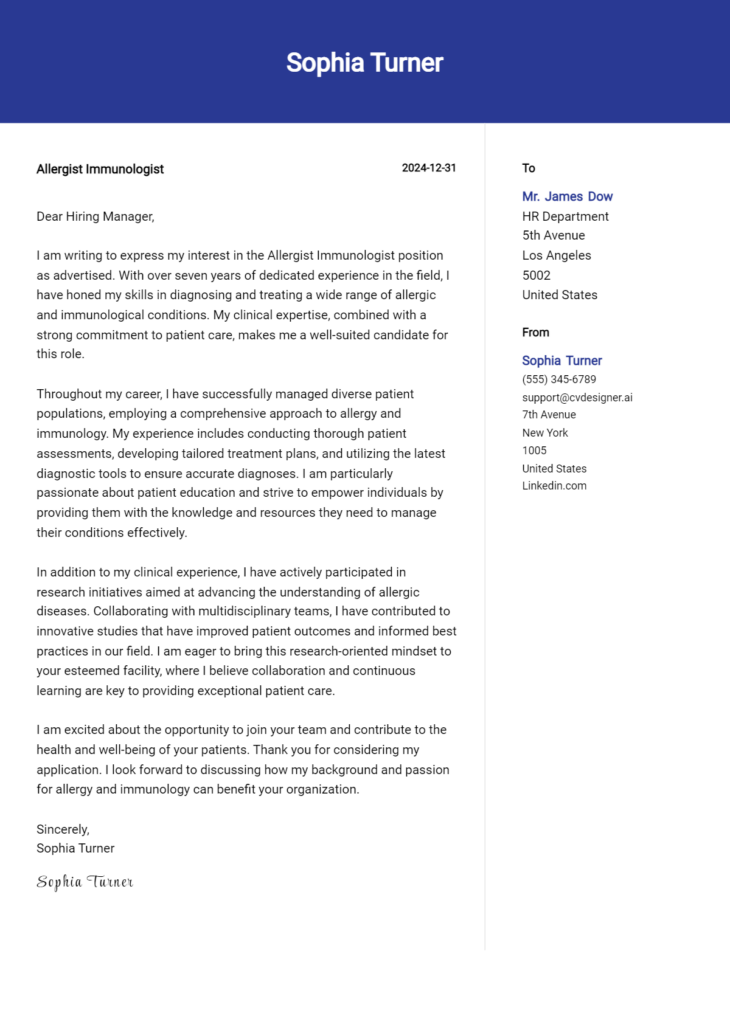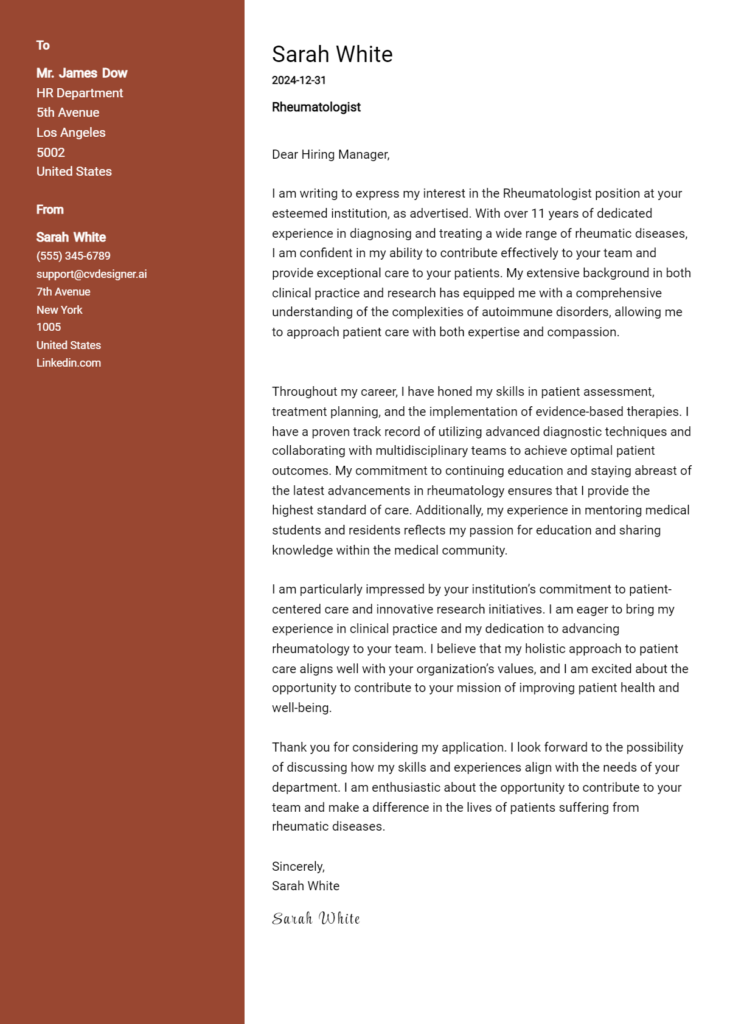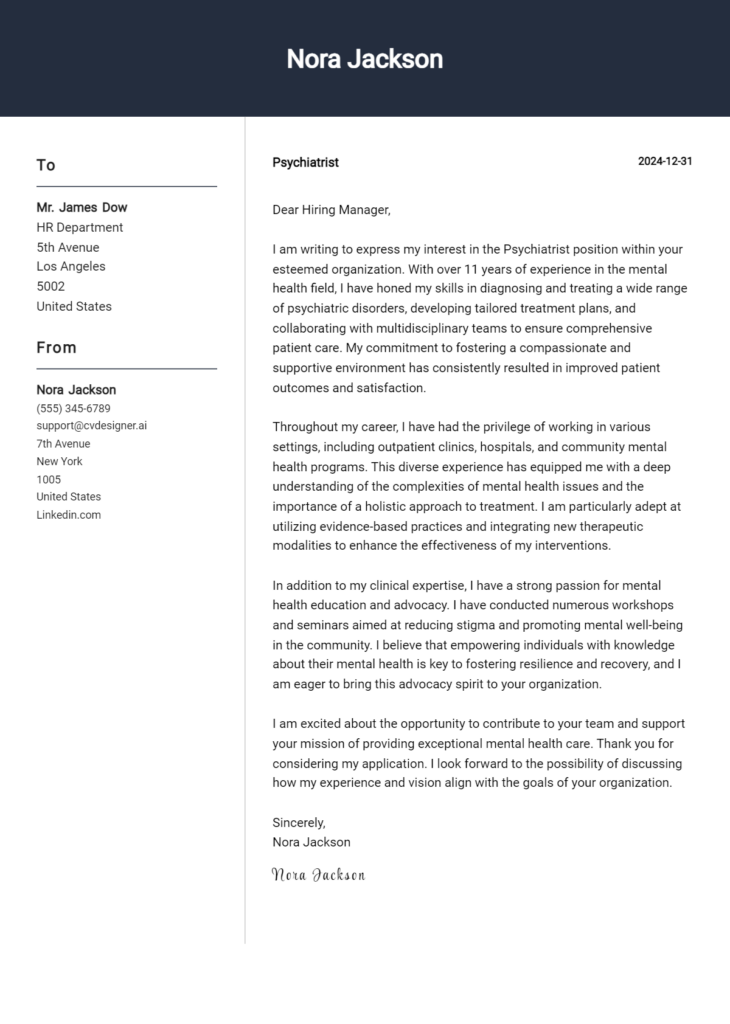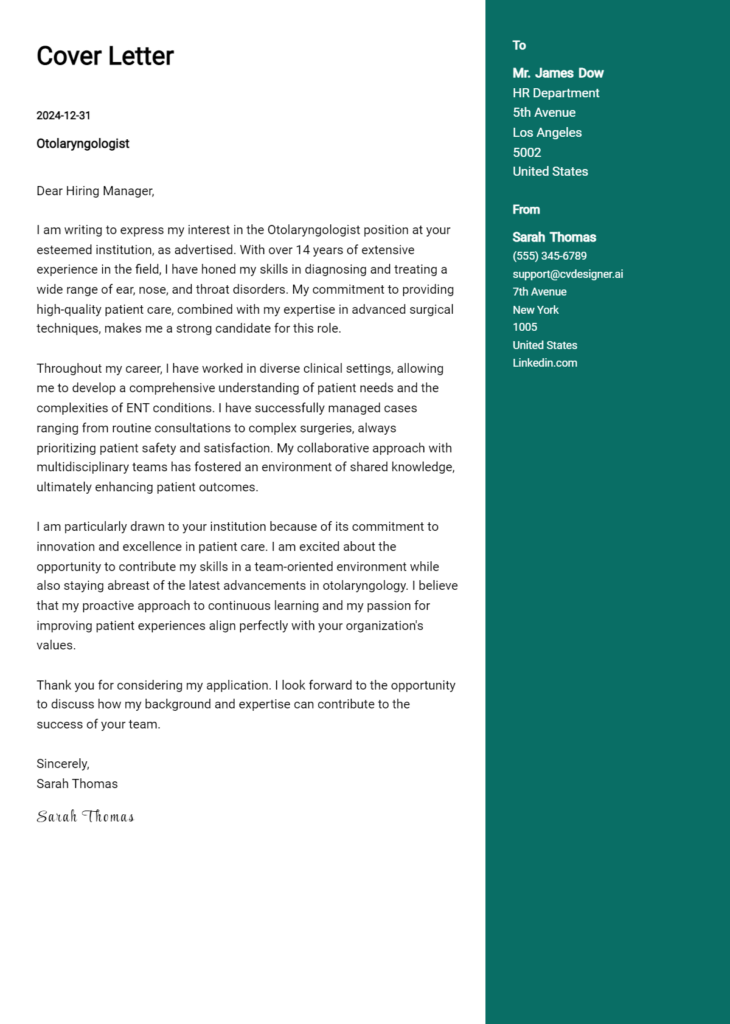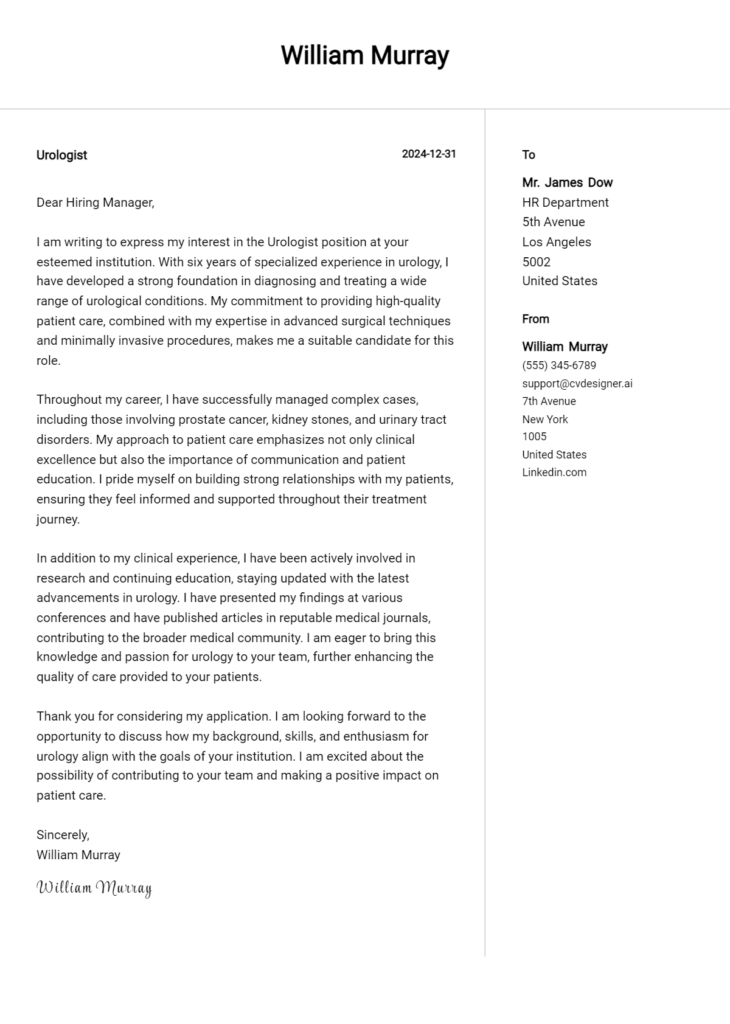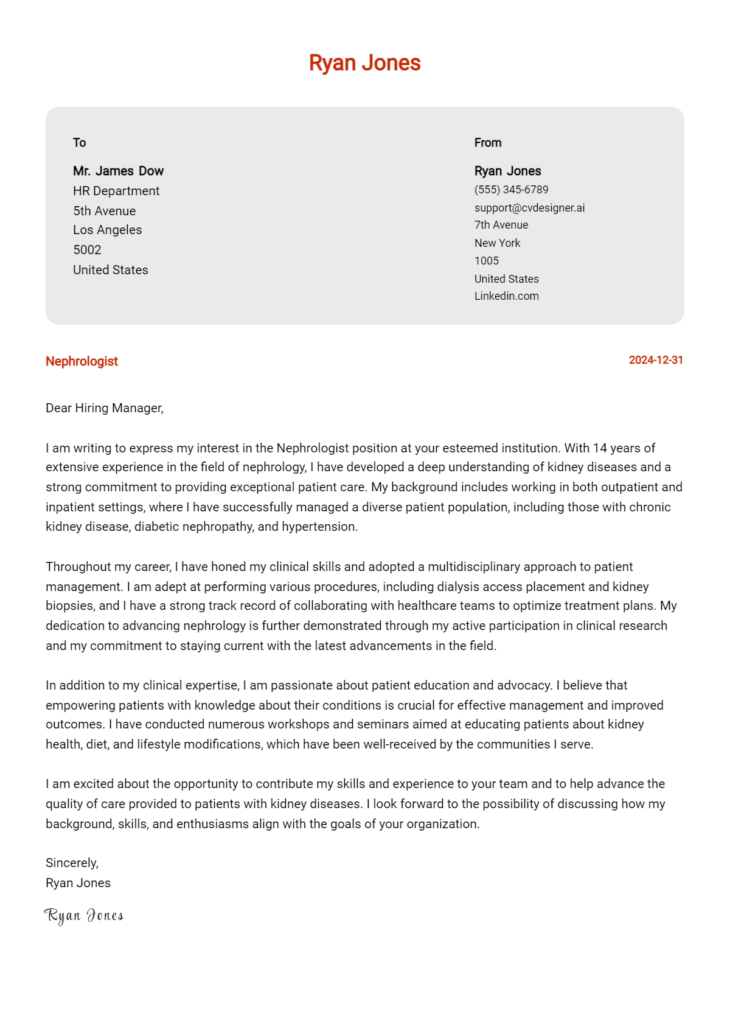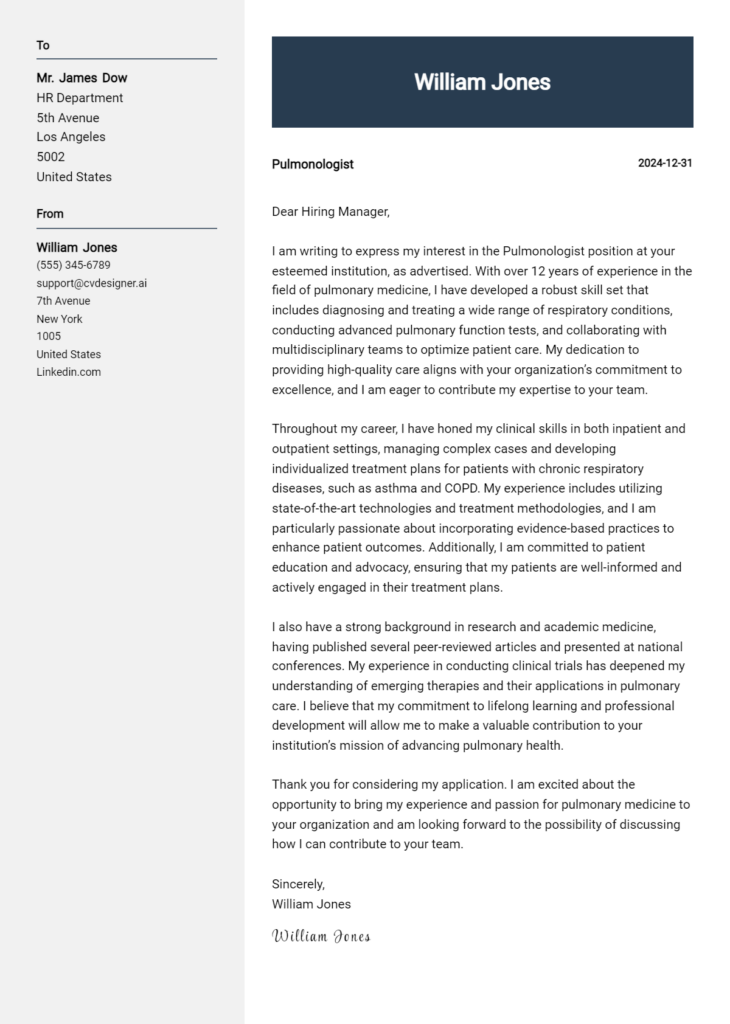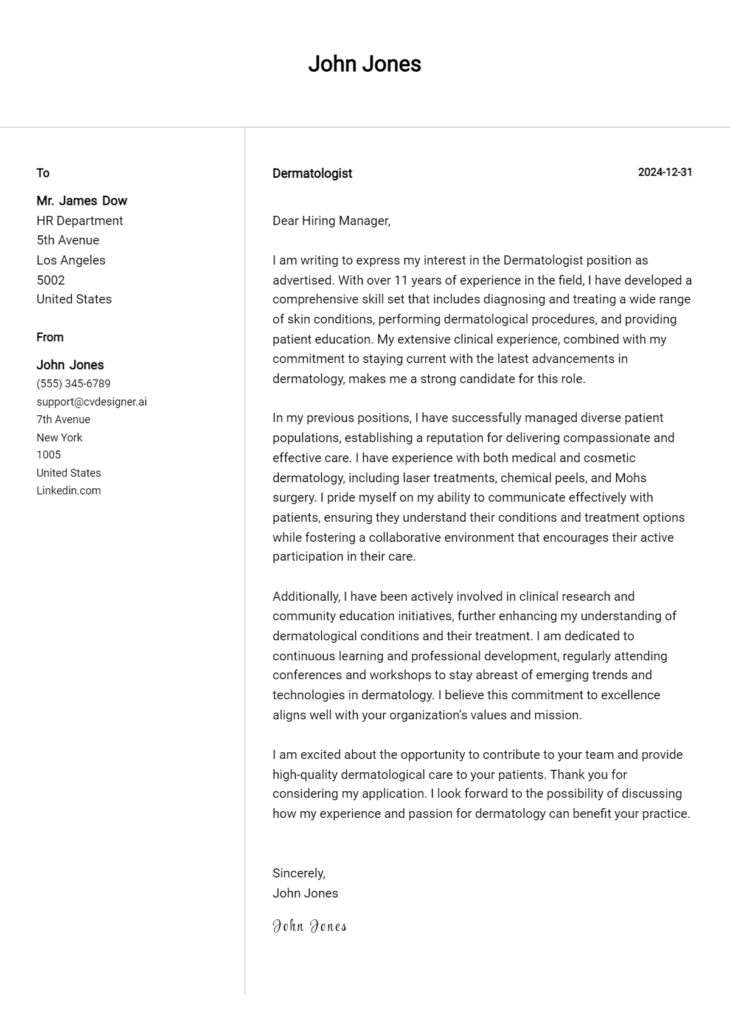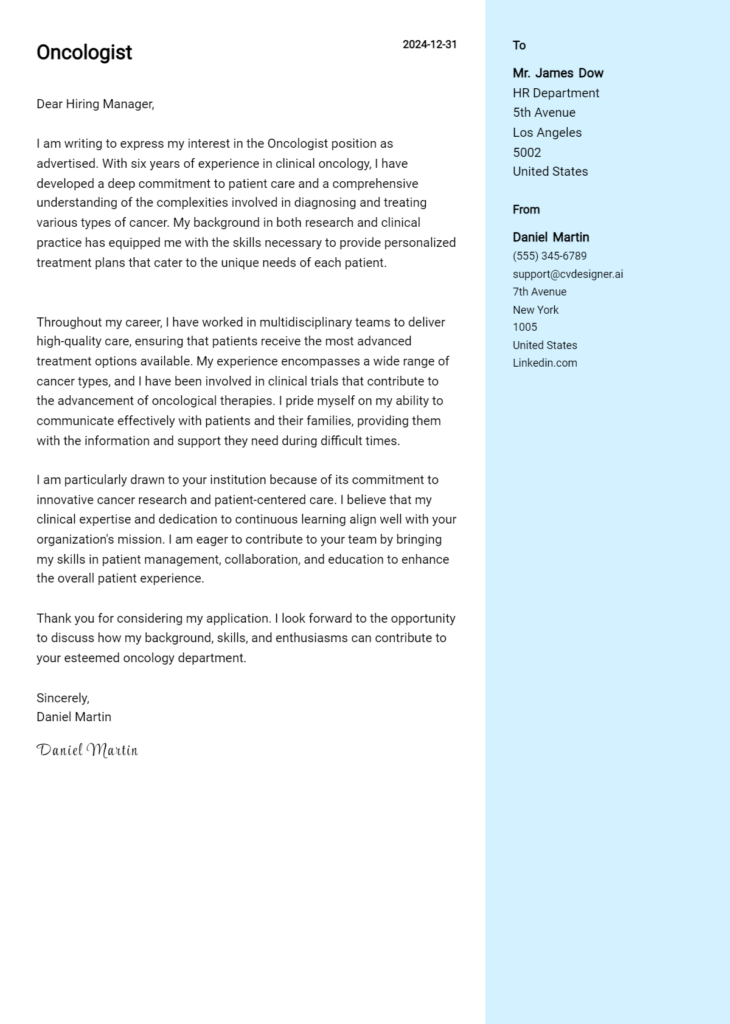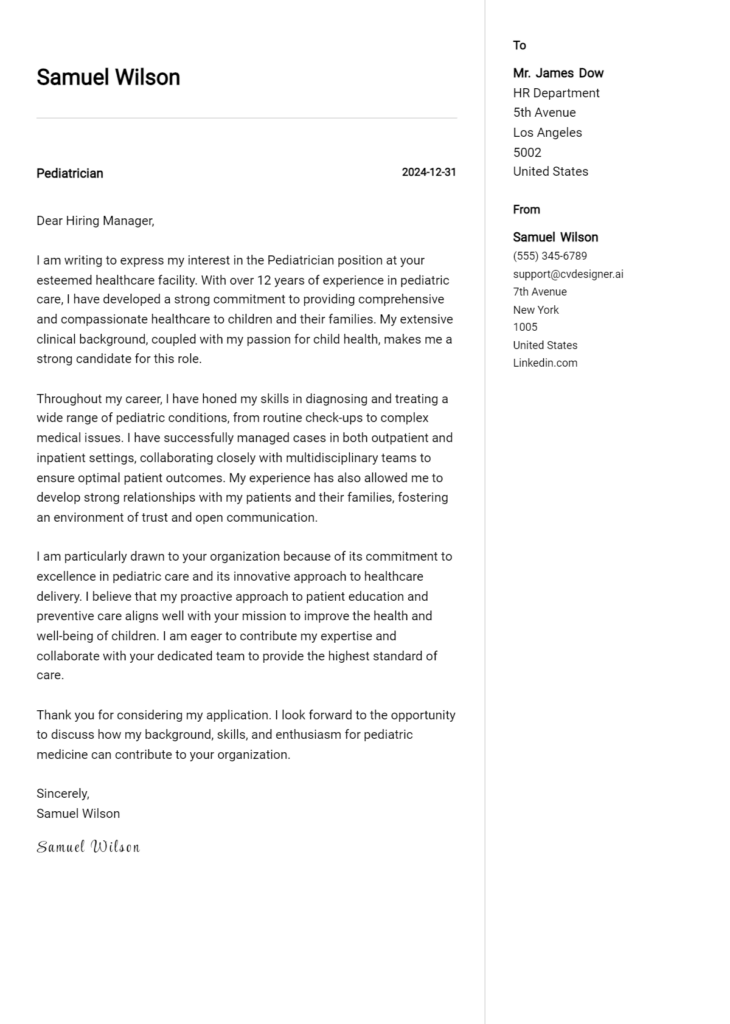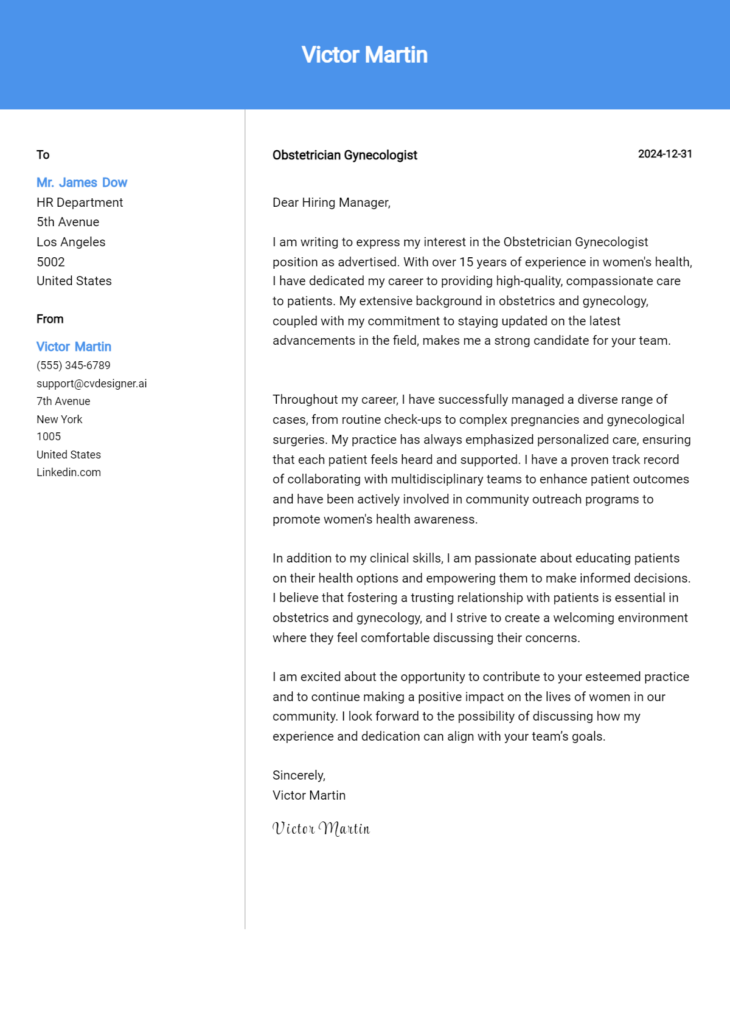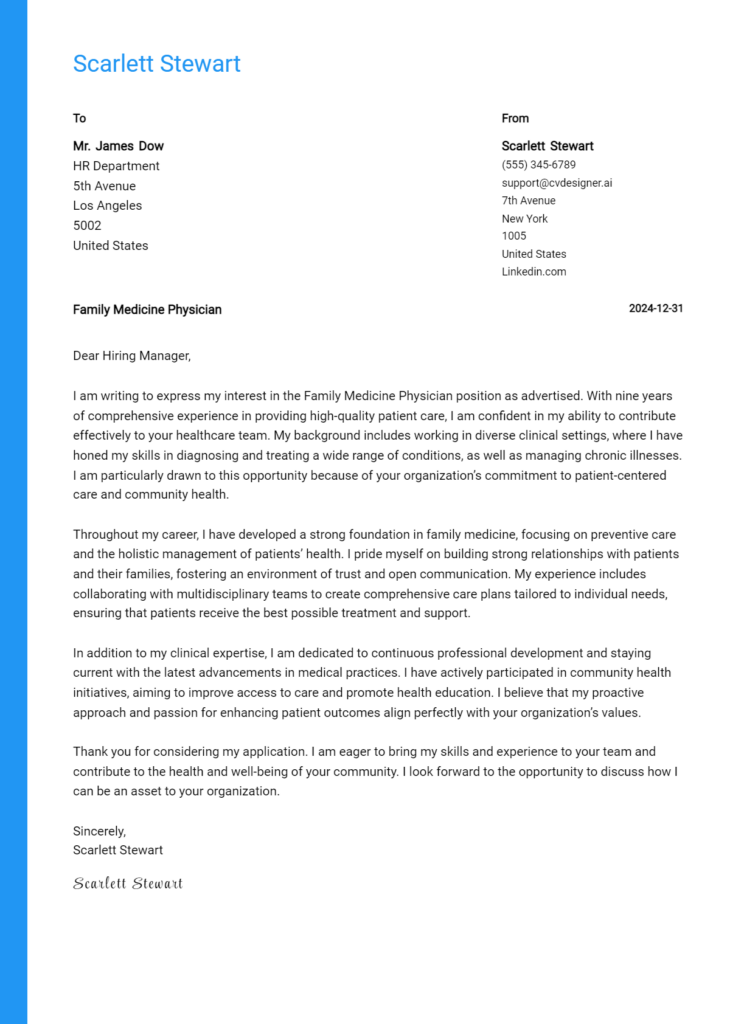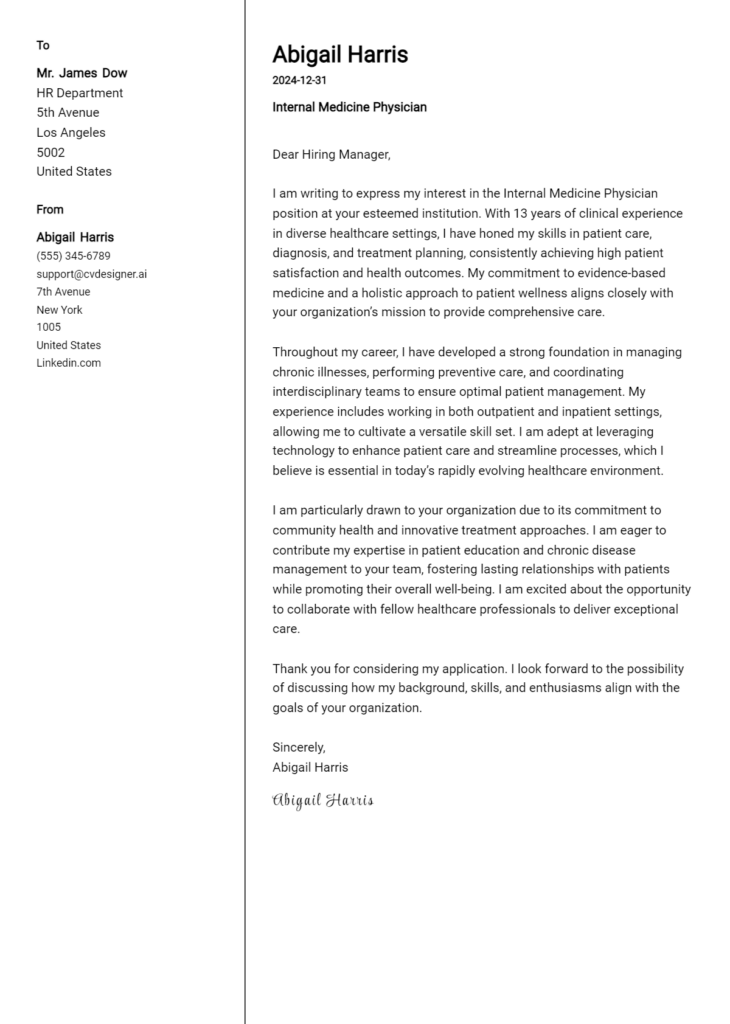Infectious Disease Specialist Cover Letter Examples
Explore additional Infectious Disease Specialist cover letter samples and guides and see what works for your level of experience or role.
How to Format an Infectious Disease Specialist Cover Letter
Crafting an effective cover letter is essential for an Infectious Disease Specialist, as it serves as your first opportunity to make a lasting impression on potential employers. The format of your cover letter not only showcases your clinical expertise and passion for public health but also reflects your ability to communicate complex medical issues clearly and concisely. A well-structured cover letter captures the attention of hiring managers while emphasizing your dedication to combating infectious diseases—an invaluable trait in this critical field.
In this guide, we’ll delve into the key components of a professional cover letter, providing insights and examples specific to the infectious disease specialty to help you create a compelling document.
We will focus on the essential elements of a cover letter, including:
- Cover Letter Header
- Cover Letter Greeting
- Cover Letter Introduction
- Cover Letter Body
- Cover Letter Closing
Each section plays a crucial role in highlighting your qualifications and professionalism. Let’s break down each part to help your cover letter stand out in the competitive landscape of infectious disease specialists.
Importance of the Cover Letter Header for an Infectious Disease Specialist
The cover letter header is a crucial component of your application as an Infectious Disease Specialist, as it serves as the first impression for potential employers. A well-structured header not only provides essential contact information but also establishes a tone of professionalism and clarity. It should include your name, address, phone number, email, the date, and the recipient's details (name, title, organization, and address). A clear and professional header sets the stage for your application, making it easier for the hiring manager to identify your information quickly.
Strong Example
Dr. Jane Smith 123 Health St. Cityville, ST 12345 (123) 456-7890 jane.smith@email.com October 1, 2023 Dr. John Doe Chief of Infectious Diseases City General Hospital 456 Medical Ave. Cityville, ST 12345
Weak Example
Jane S. Email: jane.smith@email.com 1234567890 10/1/23 To Whom It May Concern
The Importance of a Strong Greeting in Your Cover Letter
The greeting of a cover letter serves as a crucial introduction that sets the tone for the entire document. A well-crafted greeting not only demonstrates professionalism but also shows personalization, which can make a lasting impression on the hiring manager. By addressing the recipient directly, you convey respect and a genuine interest in the position. Avoiding generic greetings, such as "To Whom It May Concern," is essential; instead, take the time to research the hiring manager’s name if it's available. This personal touch can differentiate you from other candidates and reflect your commitment to the role.
Here are some examples of strong and weak greetings for an Infectious Disease Specialist cover letter:
Strong Greeting Example
Dear Dr. Jane Smith,
Weak Greeting Example
To Whom It May Concern,
The Importance of a Well-Crafted Cover Letter Introduction for an Infectious Disease Specialist
A well-crafted cover letter introduction is crucial for an Infectious Disease Specialist, as it sets the tone for the rest of the application and serves as the first impression on the hiring manager. This introduction should not only capture their attention but also express genuine interest in the role and briefly highlight key skills or noteworthy achievements relevant to the position. A strong introduction can differentiate a candidate from others by demonstrating enthusiasm and showcasing expertise in a concise manner. In contrast, a weak introduction may fail to engage the reader, leading to missed opportunities. Below are examples illustrating both strong and weak cover letter introductions.
Strong Example
Dear [Hiring Manager's Name], As a dedicated Infectious Disease Specialist with over eight years of experience in clinical research and patient care, I am excited to apply for the position at [Company Name]. My extensive background in managing complex infectious cases and my recent contributions to a groundbreaking study on antibiotic resistance have solidified my commitment to advancing public health. I am particularly drawn to your organization's innovative approach to infectious disease prevention and treatment, and I am eager to bring my expertise to your esteemed team.
Weak Example
To Whom It May Concern, I am writing to apply for the Infectious Disease Specialist position. I have some experience in this field and think I would be a good fit. I hope you will consider my application.
Purpose of the Cover Letter Body for an Infectious Disease Specialist
The cover letter body for an Infectious Disease Specialist serves a critical function in presenting the candidate's qualifications and suitability for the role. It is the opportunity to highlight relevant skills, experiences, and specific accomplishments that demonstrate the candidate's expertise in managing infectious diseases, conducting research, and implementing public health strategies. By detailing particular projects—such as successful outbreaks containment or contributions to significant research publications—the candidate can effectively convey their value to the company and how they can contribute to its goals. This section should blend technical knowledge with an understanding of the healthcare landscape, ultimately persuading hiring managers of the candidate's potential impact.
Strong Example
I am particularly proud of my role in leading a multidisciplinary team at XYZ Hospital during the Ebola outbreak in West Africa. My efforts not only resulted in the successful containment of the virus within the region but also contributed to the development of innovative protocols that have been adopted in various healthcare systems globally. Additionally, my research on antimicrobial resistance published in the Journal of Infectious Diseases has provided new insights into treatment protocols, which can significantly benefit your organization’s ongoing projects in public health and patient care.
Weak Example
I have worked in infectious diseases for several years and have done some research. I think I would be a good fit for your organization because I have experience in this field. I have also helped with some outbreaks, but I can't remember the specifics right now.
Importance of the Cover Letter Closing for an Infectious Disease Specialist
The closing paragraph of a cover letter is crucial for leaving a lasting impression on potential employers. It should effectively summarize your qualifications, reiterate your enthusiasm for the role, and encourage the hiring manager to take the next steps, such as reviewing your resume or scheduling an interview. A strong closing conveys confidence and professionalism, while a weak closing may leave the reader uncertain about your interest or qualifications.
Strong Example
In summary, my extensive experience in infectious disease management, combined with my passion for public health advocacy, positions me as a strong candidate for the Infectious Disease Specialist role at your esteemed institution. I am genuinely excited about the opportunity to contribute to your team and advance the mission of improving community health. I look forward to discussing how my background and skills can support your initiatives and would be thrilled to schedule an interview at your earliest convenience. Thank you for considering my application.
Weak Example
I think I would be okay for the Infectious Disease Specialist job. I have some experience in the field, and I hope you look at my resume. It would be nice to hear back from you, but no rush. Thanks for your time.
These tips will guide candidates in crafting an effective cover letter for the role of an Infectious Disease Specialist. A well-written cover letter not only highlights your technical skills but also demonstrates your problem-solving abilities, knowledge of the Software Development Life Cycle (SDLC), teamwork experience, and a genuine passion for continuous learning. By integrating these elements, you can present a compelling case for your candidacy.
Tips for Writing a Cover Letter as an Infectious Disease Specialist
Highlight Your Technical Skills
Emphasize your expertise in infectious diseases, including knowledge of epidemiology, microbiology, and diagnostic techniques. Use specific examples from your experience that showcase your proficiency in utilizing advanced laboratory equipment or software tools pertinent to infectious disease research and treatment.Demonstrate Problem-Solving Abilities
Infectious Disease Specialists often face complex challenges. Illustrate your problem-solving skills by sharing a specific instance where you identified a public health problem and successfully implemented a solution. This could involve developing a treatment plan or conducting a community outreach initiative that improved patient outcomes.Showcase SDLC Knowledge
If applicable, discuss your familiarity with the Software Development Life Cycle (SDLC) in relation to health informatics and data management systems. Highlight how you have utilized these processes to improve patient care, enhance reporting systems, or streamline research projects. This will underscore your ability to integrate technology with medical practices.Emphasize Teamwork and Collaboration
Infectious Disease Specialists often work in multidisciplinary teams. Provide examples of how you have collaborated with other healthcare professionals, researchers, or public health officials. Explain your role in these collaborations and how your contributions led to successful outcomes, reinforcing your ability to work effectively in a team environment.Express a Passion for Continuous Learning
The field of infectious diseases is constantly evolving, making continuous education essential. Mention any recent training, certifications, or conferences you’ve attended that demonstrate your commitment to staying updated with the latest research and practices. This shows potential employers that you are proactive about personal and professional growth.
By following these tips, you can create a compelling cover letter that effectively showcases your qualifications for the Infectious Disease Specialist role. For additional resources, consider utilizing cover letter templates or a cover letter builder to streamline your writing process.
Common Mistakes to Avoid in an Infectious Disease Specialist Cover Letter
Crafting a compelling cover letter is essential for standing out as an Infectious Disease Specialist. Avoiding common mistakes can enhance your chances of making a positive impression on hiring managers. Here are some pitfalls to steer clear of:
Generic Language: Using a one-size-fits-all approach can weaken your application. Tailor your cover letter to reflect your specific interest in the position and institution.
Lack of Specific Examples: Failing to illustrate your qualifications with concrete examples can make your letter forgettable. Highlight specific experiences that showcase your expertise in infectious diseases.
Ignoring the Formatting: Poor formatting can distract from your message. Follow a professional cover letter format to ensure clarity and readability.
Typos and Grammatical Errors: These mistakes can undermine your professionalism. Always proofread your cover letter or have someone else review it before submission.
Overly Long Letters: Brevity is key. Aim to keep your cover letter concise and focused on the most relevant information to engage the reader without overwhelming them.
Neglecting to Research the Employer: Not understanding the institution or its values can lead to missed opportunities to align your goals with theirs. Research the organization and reflect that knowledge in your letter.
Not Including a Call to Action: Failing to express your desire for an interview can leave your letter feeling incomplete. Conclude your letter with a strong call to action that invites further communication.
By steering clear of these common mistakes and utilizing resources like cover letter examples, you can create a compelling application that showcases your qualifications as an Infectious Disease Specialist.
Cover Letter FAQs for Infectious Disease Specialist
What should I include in my cover letter for an Infectious Disease Specialist position?
When crafting your cover letter, focus on your relevant education, clinical experience, and specialized training in infectious diseases. Start with a strong opening that captures your passion for the field. Mention specific experiences, such as managing outbreaks or conducting research, that demonstrate your expertise. Highlight any certifications, like board certification in infectious diseases, and your familiarity with current treatment protocols and public health policies. Additionally, if you have experience in community outreach or education, include that to show your holistic approach to infectious disease management. Conclude by expressing enthusiasm for the position and a desire to contribute to the organization’s mission.
How do I demonstrate my expertise in infectious diseases in my cover letter?
To effectively demonstrate your expertise, provide concrete examples of your clinical experiences and research contributions. Mention specific infectious diseases you've encountered and your role in diagnosis, treatment, or prevention. Discuss any relevant projects you’ve worked on, such as research studies, community health initiatives, or infection control programs. It’s also beneficial to refer to any published work or presentations at conferences. If you hold specialized training or fellowships, be sure to highlight these as well. Incorporating terminology and concepts relevant to infectious disease practice will further showcase your knowledge and familiarity with the field.
How can I tailor my cover letter to a specific job posting?
Tailoring your cover letter involves closely reading the job description and aligning your skills and experiences with the requirements listed. Start by identifying key qualifications or experiences the employer is seeking and reflect these in your letter. Use specific language from the job posting to demonstrate your fit for the role. For instance, if the position emphasizes research, discuss your relevant projects and findings. Additionally, mention the organization’s values or goals and explain how your background aligns with them. This personalized approach shows that you have done your homework and are genuinely interested in the specific role.
Should I include my research and publications in my cover letter?
Yes, including your research and publications can significantly enhance your cover letter, especially for an Infectious Disease Specialist position. Highlighting your research experience demonstrates your commitment to advancing knowledge in the field and your ability to contribute to evidence-based practice. Briefly summarize key projects or studies you’ve conducted, particularly those that led to significant findings or advancements in infectious disease management. If you have published articles, mention them by name and their impact on the field. This not only showcases your expertise but also illustrates your ability to communicate complex information effectively, a crucial skill in both clinical and academic settings.
Build your Cover Letter in minutes
Use an AI-powered cover letter builder and have your letter done in 5 minutes. Just select your template and our software will guide you through the process.

